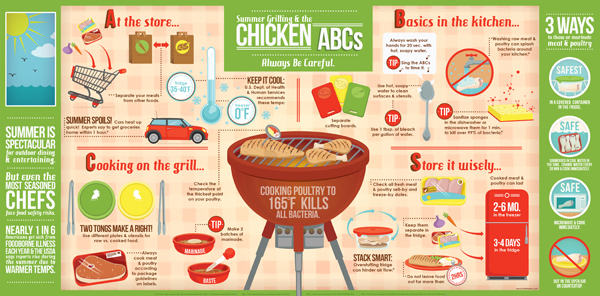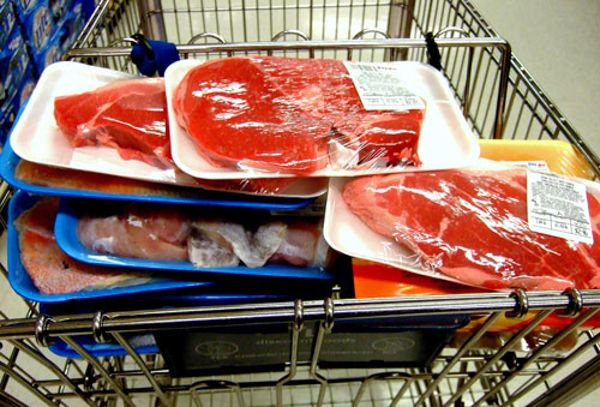

My best friend has a saying: "What's life without a little risk?" This is usually applied to a select few scenarios, most often involving the possibility of death and/or a very good story. But when it comes to summer grilling, more than a couple "what ifs" come to mind that make taking the safer-than-sorrier route a very compelling option.
You know the drill -- lax food safety practices leading to pain. Sleepless nights. Gas. Sure, there are those among us who are just intuitively good cooks and know all these rules like the back of their Kindle cookbooks. But for everyone else, it might come in handy to take a quick primer before you accidentally poison yourself and all your Fourth of July guests.
With that in mind, this isn't a guide for the conservative, the timid, the chronically color-by-number. This is a guide for those who really couldn't give a rat's ass about proper food storage and who'd much rather do their damnedest to tempt fate. Oh, so the correct temperature for keeping food in a fridge is under 40 degrees Fahrenheit? Why don't I crank this b*tch up to 50? Oh, you're supposed to wash your hands for at least 20 seconds (or long enough to sing the ABC song twice)? Ain't nobody got time for that.
Check out the infographic below this list to learn how not to be a total, blundering idiot at the grill and in the kitchen. For everyone else, here are 15 Sure-Fire Ways to Guarantee You'll Get Food Poisoning This Summer, Probably.
_______________
1. Feel free to use raw meat as all-purpose grocery bag décor

Most meats are either bagged or shrink-wrapped, but what's stopping that glossy Commander Crunch box from tearing your steak a new one? Cross-contamination happens when bacteria-infested juices from uncooked foods come into contact with other foods they have no business coming into contact with. So it's best to separate your raw meats from your other groceries from the get-go, right out of the grocery store. That way if and when they leak, at least they'll leak all over each other and not into your precious breakfast cereals. Unless, you know, you're trying to kill somebody.
Picthx Kitchn
2. Leave groceries in the car while you spend the day at Disneyland
Summer at Disneyland means higher temperatures and longer lines - perfect conditions for flourishing bacteria. Foodsafetysite.com recommends that perishable food should not be left out at room temperature for more than two hours, no more than one hour if it's hotter than 90 degrees F. They also recommend storing food in the back seat instead of the trunk, as temperatures back there can easily reach over 100 degrees F.
Picthx Bimmer Forums
3. Make sure to use the same cutting board, tongs and plates for everything
You know what they say, don't eat where your bacteria sh*ts. Wait. Well, whatever the maxim is, the same bacteria that are wallowing around in your meat juices don't just disappear from those juices just because the meat's been cooked. If you're using the same cutting boards, tongs, knives and plates to handle raw meat as you are to handle cooked meat, you're practically nullifying the whole cooking process. We've heard of paleo before, but that's something else entirely.
Picthx Wikimedia
4. Skip the directions
Different meats mean different cooking times and different cooking temperatures. Foster Farms states that cooking poultry at 165 degrees Fahrenheit cooks all bacteria, while about.com places it at between 8 - 20 minutes for steak and 5 - 12 minutes for hot dogs. When in doubt, check the packaging.
Picthx Food Safety News
5. Only check the surface temperature for doneness
A recent episode of Masterchef showcased a gorgeous shiitake black cod which was also, sadly, completely raw inside. While this isn't much of an issue with steaks, other meats like burgers and sausages actually need to be cooked throughout in order to not to leave you huddled over the toilet seat bemoaning your entire existence. Do yourself a favor, stick that thermometer right where it hurts. Also note that charcoals should be grey and glowing before you even consider cooking on them. Otherwise all you'll get is toast.
Picthx Kitchn
6. Leave the fridge and freezer doors open
Aside from turning your whole house into an ice bar, leaving your fridge door open also hinders the storage process, surprise surprise. The U.S. Department of Health and Human Services recommends storing meat at between 35 and 40 degrees Fahrenheit in the refrigerator, and at 0 degrees Fahrenheit in the freezer.
Picthx Pancakes and French Fries
7. Don't wash your hands
Did you know you're probably not washing your hands long enough? Yep, that eyeblink rinse-soap-rub-rinse routine should take you at least 20 seconds, or long enough to sing the ABC song or Twinkle Twinkle Little Star twice. Imagine breaking into a rousing rendition the next time you step away from the grill, and coming back to a round of uproarious applause. Trust me, your stomach and everyone else's appetites will thank you for it. Mmm, probably.
Picthx Afro News
8. Use the same sponge you've had since college
By now, you've probably heard that the single most unsanitary object in a person's house is his kitchen sponge. Like with bath towels, it just doesn't occur to us to wash the darn things because, well, aren't they supposed to be clean to begin with? It turns out that the five major causes of food-borne illness such as salmonella, E.coli, campylobacter, clostridium perfringens and staphylococcus can easily be found on sponges, according to food website the Kitchn, and every time you think you're cleaning your guest's precious dishes, you're actually just sharing the wealth. Luckily, sanitation is as easy as tossing one of those dirty, dirty boys in the microwave for a minute to kill over 99% of the bacteria. Granted, 1% of bacteria is still a hell of a lot, but at least your conscience will be cleaner than that brillo pad.
Picthx Parsimonious Princess